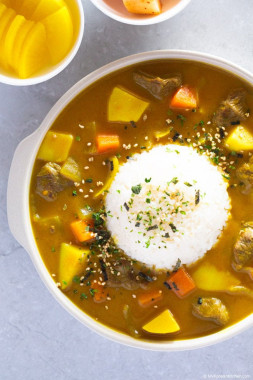[RECIPE] Korean Curry Rice (Kare Rice)
Ingredients
<span style="color:#323232;">250 g beef chuck steak (or your choice of meat), (8.8 ounce), diced
</span><span style="color:#323232;">1 Tbsp sweet rice wine (mirin)
</span><span style="color:#323232;">3/4 cup water , to mix with the curry powder
</span><span style="color:#323232;">100 g Korean curry powder (3.5 ounce)
</span><span style="color:#323232;">2 Tbsp cooking oil
</span><span style="color:#323232;">200 g onion (7 ounce), peeled and cut into large cubes
</span><span style="color:#323232;">70 g salted butter (2.5 ounce)
</span><span style="color:#323232;">150 g potato (5.3 ounce), peeled and cut into large cubes
</span><span style="color:#323232;">120 g carrot (4.2 ounce), peeled and cut into large cubes
</span><span style="color:#323232;">4 cups water
</span><span style="color:#323232;">steamed rice , to serve
</span>
Instructions
<span style="color:#323232;">In a bowl, marinate the meat with sweet rice wine (mirin), then set it aside for 5 minutes.
</span><span style="color:#323232;">In a small jug, combine 3/4 cup of water with the Korean curry powder. Mix well until you achieve a smooth, well-blended mixture.
</span><span style="color:#323232;">Preheat a large pot (e.g. dutch oven) over medium-high heat. Then, add the cooking oil and sauté the onions until they turn golden brown.
</span><span style="color:#323232;">Add the previously marinated meat to the pot and stir. Cook the meat until it reaches a medium level of doneness, with a slight hint of pink in the center.
</span><span style="color:#323232;">Add the butter to the pot and stir until it completely melts and evenly incorporates into the dish.
</span><span style="color:#323232;">Add the potato and carrot pieces to the pot, and then pour in 4 cups of water.
</span><span style="color:#323232;">Bring the pot to a boil over medium-high heat. Continue cooking uncovered for about 30 minutes, periodically skimming off any bubbles or foam that may form on the surface and discarding them. Stir occasionally to prevent sticking.
</span><span style="color:#323232;">Finally, add the prepared curry powder mixture to the pot and stir it in until the curry thickens, which should take around 1 minute.
</span><span style="color:#323232;">Serve the curry on a bed of steamed rice with a variety of side dishes to complement the flavors. Some popular side dishes include kimchi, radish kimchi, pickled radish, and a refreshing pickled cucumber. You can store any leftover curry in an airtight container in the refrigerator for 3 to 4 days, or freeze it for up to 3 months.
</span>
